This long, narrative poem, Radiant Shards: Hoda’s North End Poems, traces the sacrifice and suffering of devoted but destitute parents, Russian immigrants who are acutely affected by the Depression and struggle relentlessly to survive in Winnipeg. More importantly, with its focus on the life experience and inner world of their tenacious daughter – and as the first poetic project to give voice to a Jewish sex worker, a figure that has been all but erased from literary history – Radiant Shards is a compassionate and humanizing work. The poem invokes Adele Wiseman’s 1974 novel Crackpot, described by Jewish Studies scholars Ruth Wisse as a foundational twentieth-century literary text and by Josh Lambert as a radically feminist work. This book imagines the interior life of the novel’s protagonist, an obese Jewish sex worker named Hoda, who services the boys and men of North End Winnipeg during the first half of the twentieth century. In Radiant Shards, Hoda reflects personally and knowingly on the experiences of her complicated life. Against the structural arc of novelistic events that shape her worldview, she plumbs the depths of her suffering and the triumph of her will from a poetically imagined position of maturity and self-awareness. This creative project also incorporates archival/historical photographs housed in the Jewish Heritage Centre of Western Canada and the Archives of Manitoba. These images ground the poet’s lyric presentation of Hoda and deepen the resonant voice of a character that originally was modelled on an actual North End resident.
“From Adele Wiseman’s novel, Ruth Panofsky has distilled the voice of sex worker and “cracked pot” Hoda: sometimes lewd, often plangent, always recalling the shattered way we live and make sense out of (nearly) impossible histories of violence and revolutionary love. These shards of poetry find the beauty in the broken, and the monologic twist of Radiant Shards is as wry as it is tender. Accompanied by beautiful period photographs of Winnipeg’s North End and powered by Panofsky’s poems, Hoda speaks: neighbourhood historian, global truth-teller, radiant hostess.”
—Tanis MacDonald, author of Mobile
“Lewd, you say?” The questioning voice of Hoda from Adele Wiseman’s Crackpot is at the centre of Ruth Panofsky’s new collection, Radiant Shards: Hoda’s North End Poems. Kosher butchers, the Prince of Wales, and North End daily life resonate anew in Panofsky’s provocative re-imagining of Wiseman’s Winnipeg.”
—Norman Ravvin, author of The Girl Who Stole Everything
powered by Crowdcast
Ruth Panofsky is an award-winning poet who lives and writes in Toronto, where she teaches Canadian Literature and Culture at Ryerson University. She is the author of The Force of Vocation: The Literary Career of Adele Wiseman (2006) and The Literary Legacy of the Macmillan Company of Canada: Making Books and Mapping Culture (2012). Her award-winning critical edition of the collected poetry of Miriam Waddington appeared in two volumes in 2014 and, most recently, she edited The Spice Box: Canadian Jewish Writing (2017). Her newest work, Toronto Trailblazers: Women in Canadian Publishing, which focuses on key twentieth-century publishers, editors, and literary agents, was published in 2019. She is also an award-winning poet. She received the Helen and Stan Vine Canadian Jewish Book Award for Laike and Nahum: A Poem in Two Voices. Radiant Shards: Hoda’s North End Poems, her third volume of verse, received a Hadassah-Brandeis Institute Research Award.
Foreword
Hoda, the protagonist of Adele Wiseman’s 1974 novel Crackpot, has long occupied my mind. Years ago, she leapt off the page to become a literary companion and now—as a result of my poetic engagement with Wiseman’s fiction—she has made her way into this volume.
Radiant Shards would not exist but for Wiseman’s creation of a fully formed character and the particular world she inhabits: the Jewish enclave of North End Winnipeg during the first half of the twentieth century. Indeed, readers who know Crackpot will recognize the figures and narrative arc of these poems, as well as the liberties taken along the way. And for those unfamiliar with the novel, Hoda resides here, brought to new life.
In Wiseman’s fiction, the sex worker Hoda—she preferred the term to prostitute—is presented via a third-person narrator. In my work, she is given her own lyric voice. Occasionally, she evokes the language of Crackpot. Always, she speaks in a voice of my imagining. Alternately youthful and mature, this voice plumbs Hoda’s private thoughts and tangled feelings. Sometimes, it is directed outward in response to those who would question Hoda’s choices and behaviour.
Wiseman claimed to have based her heroine on an actual figure of North End Winnipeg, once home to the city’s red light district. Over the course of this project, my admiration for the loving and resilient Hoda—a hybrid of the real, the fictional, and now the poetic—has only grown and deepened.
&mdashToronto, January 2019
Prologue
As I walk
the North End
streets
Hoda’s body
the pitch
of her voice
beckon
Soon
I find myself
yielding
to her rare
dignity
compassion
and grace

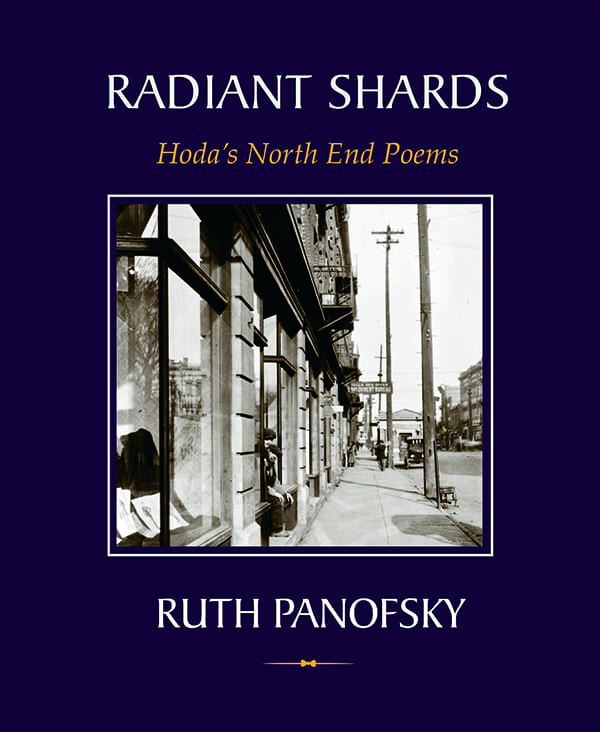

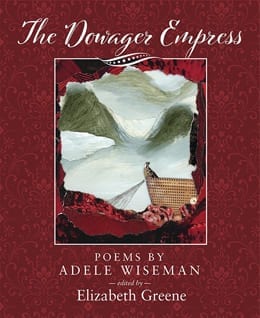
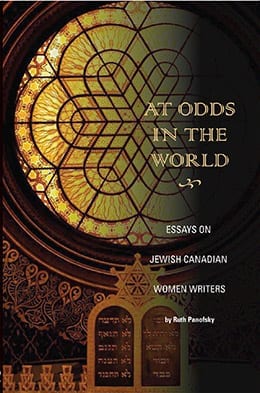
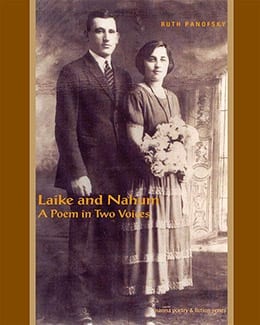
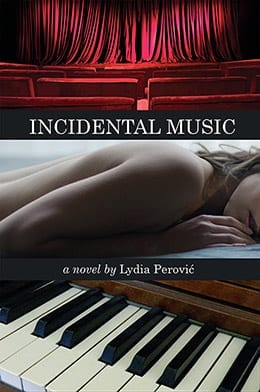
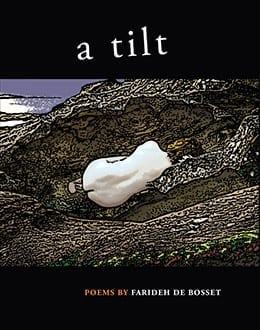

Inanna Admin –
Radiant Shards: Hoda’s North End Poems by Ruth Panofsky
reviewed by Bill Arnott for The Miramichi Reader – May 6, 2020
https://miramichireader.ca/2020/05/radiant-shards-by-ruth-panofsky
I could count the number of times I’ve read a complete poetry book in one sitting on a single digit. Until now. Ruth Panofsky’s Radiant Shards not only allows a single-sitting read but almost demands it. A sectioned story of fact and speculation, this suite of poems is well-researched yet comprised of fabricated insight that (I like to believe) must be accurate. This is an author who knows her subject intimately, adding poetic artistry that, poignantly paired with historical photos in black and white, creates an enrapturing, ekphrastic-adjacent feel.
Panofsky’s poetry reads like narrative prose, thus the story-time readability, the gradual revealing of a fully developed character, and our desire to know what comes next. As a reader, we’re granted predominantly unobstructed views aboard a depression-era trolley-like ride through Winnipeg’s North End. I can relate in more ways than one, this being my dad’s hometown, a time and city I know well, ethnic blocks and pockets of grit. Not to mention a sex worker buddy – their journey, while unique, unfailingly familiar – who I’ve written with. Following a prompt to share something funny, something personal, with a blush he/she told the story of their most embarrassing moment – dozing off on the job, mid-job. Their second most embarrassing moment? Waking up, after dozing off on the job, mid-job. Finding levity (and strength) in situations that could break others.
Within this neighbourhood Panofsky directs our windowed ride through Hoda’s childhood, family, loss, hardship, choices or lack thereof, parenthood, a youngster and woman’s survival. It would be wrong to break the fluidity of this work, so instead I share a sequence of passages in their inherent, seamless flow.
Our Prologue:
As I walk / the North End / streets / Hoda’s body / the pitch / of her voice / beckon // Soon / I find myself / yielding / to her rare / dignity / compassion / and grace
Beginnings:
Fatso cow / the kids call me / cracked too // but I know better – / my body sparkles / my mind stirs // let them jeer – / I say nuts to them
Initiation:
Hodaleh, Hodaleh / Daddy calls / his voice // nearly breaks me / he is gentle / I betray his trust // easily / sleep with boys / in the adjacent room // and pretend otherwise / I do it for him / to earn our keep // and make him safe / by my side / in my sight
And Renewal:
His words / and will / strengthen / my resolve / against the / bullying torment / that rises anew / in Daddy’s hallowed North End.
While structure allows fluent absorption of this work, Panofsky’s content – words, style, structure – pull us through this time, this space, and this story of resilience in such a way we FEEL our heroine’s strength, determination, caring, need, and yes, pride that makes an individual – real or imagined, relatable. This is a project of passion shared in a rich, engaging manner. I’m left pulling for a person I’ve never met, but perhaps now know.
Inanna Admin –
Radiant Shards: Hoda’s North End Poems by Ruth Panofsky
reviewed by Carol Lipszyc
CWS/cf 34.1,2 (2019): pg 180.
What does it mean to be so absorbed and compelled by a female character, one realized in fiction and modelled from an immigrant, that a poet imaginatively brings her back to life again?
The answer comes in Ruth Panofsky’s new work of poetry, Radiant Shards, Hoda’s North End Poems, narrated by Hoda, daughter of early twentieth-century Jewish immigrants to North End, Winnipeg. Hoda is a child born and trapped in poverty, her father, a blind storyteller,” benign and blessed,” her mother, a cleaner of houses who negotiates with the world from a fearful distance as a tumor grows like a “pink melon/seeding/her stomach.”
The answer comes in Panofsky’s “yielding” to the character’s “rare dignity/compassion/and grace,” thus redeeming for Hoda the self-respect and worth she was robbed of throughout her life. The work is a searing yet loving portraiture which, true to character and circumstance, poignantly and credibly presents Hoda’s story in pared-down language that cuts to the bone. Inspired by Adele Weisman’s fictional female protagonist in Crackpot, in turn derived from an immigrant’s lived experience, Hoda, affectionately called Hodaleh by her father in the Yiddish vernacular, is a young girl hungry for affection, scorned by her peers, negated by her teacher. To feed both herself and her father, she eventually becomes a sex worker, though Hoda attests to offering “more than sex,” [that her] “girth loves/takes suffering.” Ensuing wounds and affronts become “shards/ of [her] being,” as she sells her body to clientele in the Jewish neighborhood, their own satisfaction and grief, a “dirge for their small lives and [hers].” Is she “lewd, crude, and coarse?” she asks in a verse that reads like spoken word poetry. Her answer follows in a matter of fact voice with a rhetorical question: “I make my way/with my body/what else would I be?” That a woman of her socio-economic status had no alternative is part of her tragedy and that of her society.
At the foreground, then, is Hoda’s first-person voice, which is double-edged: a narrator’s voice that shares her storied life and the inner italicized voice which protests injustice. (At one point, Hoda joins a march for the working class, for seamstresses and their “piecework,” physically assaulting a Mountie).
Other voices briefly emerge from backstage. For example, Seraphina, whose own mother “growls and whacks,” encourages Hoda to “[meet] some classy meatballs/[make] a few extra bucks,” which leads to Hoda’s physical abuse as the men “romp about/ and roll off spent.” Note the unadorned diction that lends an authenticity to this ethnographic and artful work, and the frequent use of monosyllabic words that amplify the writing with a direct, percussive beat. While Panofsky ushers in flashes of imagery, for instance, in the birth of Hoda’s son, as she “gnaw[s] the cord/knot[s] [her]self/into the fullness/ of [that] black night,” the poet judiciously chooses language that will not so much transcend Hoda’s harsh world through a figurative lens but will keep us grounded in that world, clear-eyed and empathically listening.
One timeless motif that resonated with me was Hoda’s “ample body,” perceived as a source of derision (“big fat cow”) on one hand and as a source of pleasure on the other, as men “climb atop/explore the folds/of [her] body/plunge cocooning flesh.” Hoda declares: “but I know better/ my body sparkles/my mind stirs.” In her defiance, Hoda’s voice sings.
If there is a distinct line between the lived and imagined life, that line merges in Ruth Panofsky’s hands as she reconstructs the life of a woman from the past whose voice has been either historically erased, or most often, negligibly muffled and diminished of its humanity. If there is a touch of fatalism in Hoda’s words, that “God made and/bound me/ whore,” Panofsky opens our eyes, minds, and hearts to the peril the impoverished female children of the world face so that we might see ourselves in their plight.
Carol Lipszyc’s book of short stories on children and adolescents in the Holocaust, The Saviour Shoes and Other Stories, (2014) and her book of poetry, Singing Me Home, (2010) were published by Inanna. Her edited anthology of eighty poems on the heart, The Heart Is Improvisational, was published by Guernica Editions (2017). Integrating chants and narrative for esl Literacy students, she authored People Express for Oxford University Press. A chapbook of poems, In the Absence of Sons, is slated for 2020 publication by Kelsay Books. Her website can be found at http://www.carollipszyc.com.
Inanna Admin –
Radiant Shards: Hoda’s North End Poems by Ruth Panofsky
reviewed by Cindy Maguire
White Wall Review – September 11, 2020
https://whitewallreview.com/hodas-lyric-journey/
You will be riveted by the lyric voice of Hoda, the narrator of Radiant Shards: Hoda’s North End Poems. The collection, which is structured into three parts, plunges you into Hoda’s compelling story. She is a character that commands your attention. The first poem begins with Hoda’s mother’s death which leaves the young girl and her blind father at the mercy of an unscrupulous uncle. The poems are set in Winnipeg’s North End, the Jewish enclave, in the early part of the 20th century. Hoda, the protagonist created by Adele Wiseman for her novel, Crackpot (1974), has “long occupied [the] mind,” of poet and academic Ruth Panofsky, whose earlier collections include Laike and Nahum (winner of a Canadian Jewish Book Award) and Lifeline.
In Radiant Shards, Panofsky, an esteemed scholar of Canadian women’s literature, gives voice to Hoda’s innermost feelings. We experience Hoda’s frustration and hurt when her obesity blinds others to her humanity. But for the young boys of the neighbourhood, Hoda’s body is a source of comfort and release. In the section titled, “INITIATION” Panofsky skilfully describes the pleasure, heartbreak and stigma of Hoda’s sexual encounters. Before even becoming a teenager, Hoda is branded the “resident whore.”
While created almost 50 years ago, Hoda is character who is deeply relevant in the 21st century, where sex workers, immigrants and large-sized women, continue to face discrimination. But Hoda defies convention, using her ample body to support herself and her storytelling father, Danile. Despite the bitter taunts she weathers, and an unexpected pregnancy and the birth of her son which brings “crushing sadness” Hoda never loses her compassion. Panofsky writes the birth scene as a series of sharp, stabbing lines, many only a single word, making Hoda’s panic palpable. She acts quickly to shield her father from the truth and to deposit her son safely at the orphanage.
Panofsky’s decision to organize Radiant Shards according to the arc of Crackpot allows readers unfamiliar with the novel to experience Hoda’s journey and to sense the importance of the original story. Story itself is a key theme in the collection. Hoda has been raised on her Daddy’s mythic-like stories of the past and “the great miracle of her birth.” These stories sustain Hoda through dark times when she must make an impossible choice about her son, David. Panofsky’s language captures the anguish of a mother who cannot save her son, or herself, from pain and loss. In the end, Hoda must accept the consequences of her choices and the accompanying despair.
The other story, layered seamlessly into Radiant Shards, is that of poet Ruth Panofsky. Her admiration for Wiseman and her heroine sent Panofsky to Winnipeg to walk Hoda’s neighbourhood and to research Jewish life in the North End in the early 20th century. Radiant Shards blends fiction, historical record, homage, and poetry. In her foreword, Panofsky reveals that “…my admiration for the loving and resilient Hoda…has only grown and deepened.” The more time I spend with Radiant Shards, the more I admired what Panofsky has accomplished. Poetry is always as much a challenge as a delight and giving voice to another writer’s character adds another layer of complexity.
Love finds Hoda in the end, in the person of Lazar, a Ukranian immigrant with his own painful past. A man who sees Hoda for who she is – an intelligent, loving, woman, a fellow survivor who speaks truth. In the final set of poems, we hear the voice of a mature Hoda, who understands the manipulation that underpinned her sexualization and the stigma that was attached to it. But Radiant Shards shows that Hoda was much more than what others assumed: she was compassionate. An intrepid businesswoman. A woman who has come to accept herself and her life.
Woman’s bodies continue to be battlegrounds: abused, judged, and a source of lifelong angst. Fat women are particularly vulnerable to bullying and social discrimination. In the Coda of Radiant Shards, Panofsky writes Hoda’s “Homage to her Body.” It is equal parts blessing and curse, ending with grace and acceptance. Hoda’s story, as retold poetically by Ruth Panofsky, becomes a light-filled ode to seeing ourselves and others with clarity and forgiveness.